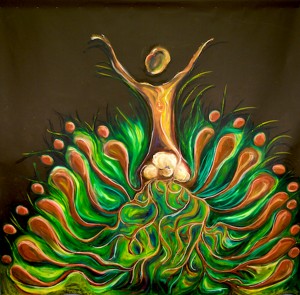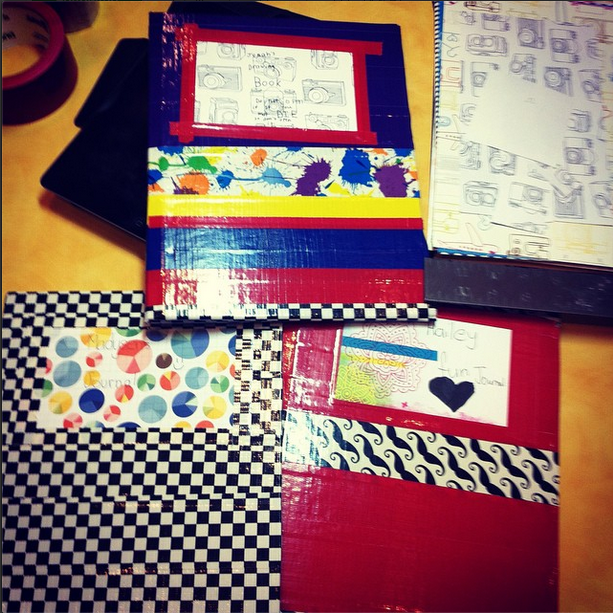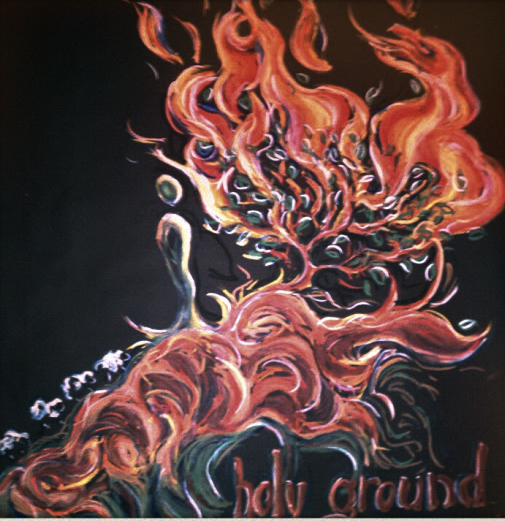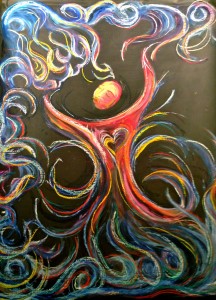A sermon about the time Joshua called all the folks from ALL over Canaan together in a Sacred Place and teased, and cajoled and invited them to remember who they are…
“i imagine that yes is the only living thing.”
~e.e. cummings
Prologue: Since receiving the Ten Words from God the Israelites have traveled the Wilderness for forty long years… generations have passed, Moses has died and Joshua takes leadership… they have passed through the Jordon and are making a life in Canaan – “the promise land” and today Joshua calls the people together at Shechem – We first hear of this sacred place Shechem (in Canaan) in the book of Genesis when God first promises this very land to Abram… Abram builds an altar in this very place and worships God… before continuing his own journey.
The book of Joshua records their passage into Canaan in it’s early chapters and the 12 tribes of Israel have spread out across the land… Joshua calls the Israelites from all over Canaan to gather once again at Shechem to renew their commitment to God.
Joshua 24:1-15
1 Then Joshua gathered all the tribes of Israel to Shechem, and summoned the elders, the heads, the judges, and the officers of Israel; and they presented themselves before God. 2 And Joshua said to all the people,
“Thus says the Lord, the God of Israel: Long ago your ancestors—Terah and his sons Abraham and Nahor—lived beyond the Euphrates and served other gods. 3 Then I took your father Abraham from beyond the River and led him through all the land of Canaan and made his offspring many. I gave him Isaac; 4 and to Isaac I gave Jacob and Esau. I gave Esau the hill country of Seir to possess, but Jacob and his children went down to Egypt.
5 Then I sent Moses and Aaron, and I plagued Egypt with what I did in its midst; and afterwards I brought you out. 6 When I brought your ancestors out of Egypt, you came to the sea; and the Egyptians pursued your ancestors with chariots and horsemen to the Red Sea. 7 When they cried out to the Lord, he put darkness between you and the Egyptians, and made the sea come upon them and cover them; and your eyes saw what I did to Egypt. Afterwards you lived in the wilderness a long time. 8 Then I brought you to the land of the Amorites, who lived on the other side of the Jordan; they fought with you, and I handed them over to you, and you took possession of their land, and I destroyed them before you.
9 Then King Balak son of Zippor of Moab, set out to fight against Israel. He sent and invited Balaam son of Beor to curse you, 10 but I would not listen to Balaam; therefore he blessed you; so I rescued you out of his hand. 11 When you went over the Jordan and came to Jericho, the citizens of Jericho fought against you, and also the Amorites, the Perizzites, the Canaanites, the Hittites, the Girgashites, the Hivites, and the Jebusites; and I handed them over to you. 12 I sent the hornet ahead of you, which drove out before you the two kings of the Amorites; it was not by your sword or by your bow. 13 I gave you a land on which you had not labored, and towns that you had not built, and you live in them; you eat the fruit of vineyards and oliveyards that you did not plant.”
14Then Joshua said, “Now therefore revere the Lord, and serve the Lord in sincerity and in faithfulness; put away the gods that your ancestors served beyond the River and in Egypt, and serve the Lord. 15 Now if you are unwilling to serve the Lord, choose this day whom you will serve, whether the gods your ancestors served in the region beyond the River or the gods of the Amorites in whose land you are living; but as for me and my household, we will serve the Lord.”
Have any of you heard a mama turn to her sassy child… young or old and say, “listen up… I carried you in my womb for nine whole months, and I wasn’t just sick in the morning, but noon and night… my feet swelled up and by skin stretched to hold you and my belly grew and grew until I was as big as a house… and then I gave birth to you… 18 hours of backbreaking labor to push you into this world.”
Or, if you were adopted like me it might go more like, “we waited and waited and waited for you, we thought we would never ever have children, and then we met you, and fell in love with you and we chose you and brought you home and made your ours.” And then she goes on…
“All these years I’ve fed you and clothed you, I’ve run you around and I’ve learned new math and had to remember old math to help you with your homework, I’ve taken care of you when you were sick, staying up all night – even the time you puked all over me, I stayed right there by your side. I’ve dried your tears and held your hand when you’re afraid… I’ve loved you and I’ve never, never asked for anything in return…”
And it’s not just Mama’s who do it, is it? We all do it. We do it to our parents and our children, to our spouses and partners and friends… we do it in community – in families and churches and baseball teams We love to tell and retell our origin stories, origins of life, origins of friendship, origins of relationships, stories of the most, the best, the worst… and we don’t tell them in some neutral or scientific way… we tell them in a way that gives them the MOST meaning and the RICHEST life and IMPORTANT purpose. We shape the stories in ways that describe who we were and who we HOPE to become…
I love this story from Joshua… I love the way his God sounds like my Mama… “After all I’ve done for you,” says this Mama God… “After I’ve chosen you and loved you, after I’ve rescued you and born you out of what enslaves you and after I’ve given you a new life; after I’ve shaped you into a community and fed you and nourished you; after I’ve walked, carried, led and conquered the world for you… now You’re going to worship another God… now you’re going to serve yourself and forget about me?!”
I love how Joshua goads the people… “Now if you are unwilling to serve the Lord, choose this day whom you will serve, whether the gods your ancestors served in the region beyond the River or the gods of the Amorites in whose land you are living…”
Just like a Mama, “Go on now… do what you want, pay no mind to me… I only gave you life.”
I don’t say this to dismiss Joshua (or our Mama’s); just like those who have shaped our stories, whether our actual mothers or other wise folks who have come before us, whose ancestors told them the story – Joshua is doing the important work of communal historian… what Joshua is saying is, “Remember who you are… you’ve seen this God at work, you’ve heard these stories, you are these stories… There’s no better GOD than this… will you choose this God? Will you love and serve this God?”
Joshua is one in a long line of oral historians that have been telling the story of God back to the community since Abram was first called to leave Haran and become a movement people. And each voice has a different tact and different flavor… for different times and places in the unfolding story of the ancient Israelites. And we can see how the people of God’s ideas about God – their theology and their moral philosophies, their ethics and their own relationships evolve through the voices of these historians… I want to spend a little time thinking about the story Joshua is telling and why… and what stories we are telling and why?
Questions to ask about this story and our stories:
It is a good story? And by that I don’t mean happy endings and simplicity…
Does it compel the people? Does it serve them? Is it life-giving? Does it bear essential truths about their identity and God’s identity?
What about the stories we tell about ourselves and about God? Are they compelling and life-giving? Do the bear real truth about who we are? About who God is?
What does Joshua include? What does he leave out? Why? What parts do we tell and leave out?
Why is God always on the side of Ancient Israel? Is God ALWAYS on our side in the stories we tell?
What does it mean to tell a story about belonging to God and claiming God in the midst of exile?
It’s likely Joshua’s version of this story is coming from the dust and ashes of exile… it wasn’t written down in real time but in the midst of fear and doubt… in the midst of losing members of the exiled Israelite community to other rituals and traditions, to other families and cultures… this was a period of deep theological development, discovery and rediscovery – the Israelites faced the very real risk of assimilation after living for a generation in exile… These stories about their history and about God invited them to remember, to reimagine and reevaluate who they are.
Transient, homeless, enslaved, exiled, abandoned and yet chosen, remembered, loved… this is an identity that is rich in the imagination of the Ancient Israelites and has been their lived experience before… this is a story of hope… of promise that the morning does and will come, if only they hold onto God and one another. Imagine hearing these words, from a loving, goading, promising God, in the midst of utter despair.
I love the next part of this story even more than the first – in the second half of chapter 24 the people answer Joshua (Joshua 24-16-28)
16Then the people answered, “Far be it from us that we should forsake the Lord to serve other gods…
19But Joshua said to the people (nudging them along), “You cannot serve the Lord, for he is a holy God. He is a jealous God; he will not forgive your transgressions or your sins…
21And the people said to Joshua, “No, we will serve the Lord!”
22Then Joshua said to the people, “You are witnesses against yourselves that you have chosen the Lord, to serve him.” And they said, “We are witnesses.” 23He said, “Then put away the foreign gods that are among you, and incline your hearts to the Lord, the God of Israel.” 24The people said to Joshua, “The Lord our God we will serve, and him we will obey.” 25So Joshua made a covenant with the people that day, and made statutes and ordinances for them at Shechem.
26Joshua wrote these words in the book of the law of God; and he took a large stone, and set it up there under the oak in the sanctuary of the Lord. 27Joshua said to all the people, “See, this stone shall be a witness against us; for it has heard all the words of the Lord that he spoke to us; therefore it shall be a witness against you, if you deal falsely with your God.” 28So Joshua sent the people away to their inheritances.
It’s not just Joshua that chooses God but all the people gathered at Shechem. And ALL of their stories are important, ALL of their voices are important. For those living in exile, this story is an invitation to renewal – to reclaim the God of their ancestors and the God of their future… of their own inheritance.
Story is power.
It can shape us and move us.
Or it can bind us and defeat us.
We have a different story than the Ancient Israelites. We are not exiles. We are not prisoners. But we have a story.
Joshua told the story of the Ancient Israelites as God’s chosen people – a protected people – but that’s not the whole story is it? Remember the time they wanted to turn back to Egypt at the first sight of the Reed Sea? Remember how they first greeted Moses when he came down the mountain with God’s Ten Words? Remember how they failed and forgot and lost? These parts are recorded in other parts of the Bible, and the book of Judges tells a less dramatic, a less violent story of how the people came to live in Canaan.
The first hearers of these words knew the whole story and so do we, but in that moment Joshua told the story they needed to hear most. And what they needed was a word of hope… even if it was a goading word of hope.
Like that story our mama tells, it’s not a story we tell because it’s historical or factual but because it’s true on a deep and visceral level. She’s telling it to compel us to listen, to behave, to remember who we are.
Joshua charges the whole community to be witnesses to one another’s’ stories – he reminds them that he is not the only storyteller, that the combined voices of the community bear the whole story of who God is.
Telling the whole story as a people of faith in our time is even more complex. There isn’t a monolithic experience of God but there is a central story about a God who hears, rescues, claims and challenges. About a God that coaxes and pushes and goads us into covenantal life, into a believing and loving God in return. What we’re being rescued from might be vastly different here in Norwood Park, than it is in Englewood. What God’s claim on us means is different here in the U.S. than in Palestine. And how God is calling us to respond, to serve, to love might look very different as well. We must listen to the chorus of voices, to their differences, and their commonalities, in order to hear the whole story of God.
How would Joshua goad us if he were here? What would he say to nudge us towards God?
What are the stories we need to tell that will give us hope?
What are the stories we need to tell that will give us courage?
What are the stories we need to tell that will call us to action?
What are the stories that you will tell about who you are and the God you claim?
This is our story. And it’s an ongoing, living, moving, breathing, dynamic story about a living, moving, breathing, dynamic God of which our we are only a part… and we’re invited to claim this God as our own and to join our voices to it, to add our lived experiences – and to listen for the experiences of others until the whole story of God gets told. Amen.
(854)


 Journal. I posted some photos and a few folks have asked for templates so I’m posting it here for you to download. Please keep in mind, this is our first attempt and we kept it simple! We used Microsoft Word to design the pages and online puzzle generators to make
Journal. I posted some photos and a few folks have asked for templates so I’m posting it here for you to download. Please keep in mind, this is our first attempt and we kept it simple! We used Microsoft Word to design the pages and online puzzle generators to make 
 of the people making new lives in the “Promised Land” Joshua takes a moment to remind them who and whose they are. Whenever I read these “recaps” of the Ancient Israelites story I’m struck by two things.
of the people making new lives in the “Promised Land” Joshua takes a moment to remind them who and whose they are. Whenever I read these “recaps” of the Ancient Israelites story I’m struck by two things.

 A sermon from the climatic moment of the Exodus story just after the Israelites have leftEgypt. Pharaoh and his hard heart cannot let them go, pursuing them to the edge of the Reed Sea, even after the plagues, the darkness, the pleading and the dying, even after his promise to let them go… and so we find them here, Pharaoh’s army at their back and God’s turbulent waters lapping at their toes…
A sermon from the climatic moment of the Exodus story just after the Israelites have leftEgypt. Pharaoh and his hard heart cannot let them go, pursuing them to the edge of the Reed Sea, even after the plagues, the darkness, the pleading and the dying, even after his promise to let them go… and so we find them here, Pharaoh’s army at their back and God’s turbulent waters lapping at their toes…